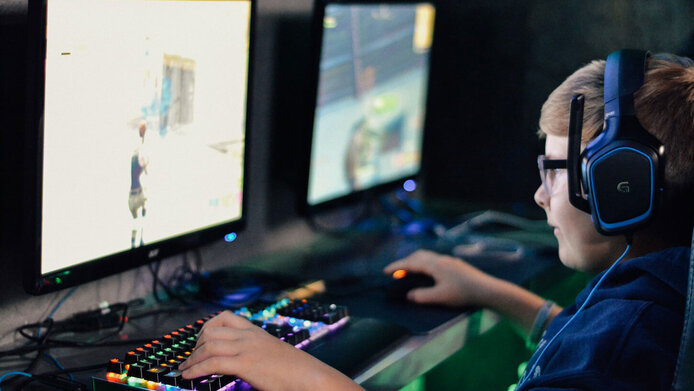How contagious is aggression in computer games?

In the course of recent decades, the number of people playing computer games has risen steadily, and the pandemic has provided many gamers with even more opportunities. Many of these games involve violent content, and opinions are divided as to whether this feeds aggression – even in research circles, there is no definitive consensus. While some say that those who play first-person shooters become more aggressive, others think they can differentiate between the real world and video games. A third view speaks of a cathartic effect, whereby media violence would reduce aggressive impulses. Tobias Greitemeyer, a social psychologist specializing in media research at the University of Innsbruck, says that computer games containing violence increase aggression. In 2014 he published a meta-analysis to show that this effect, while not yet massive, actually exists.
Social phenomena are contagious
Greitemeyer started out by investigating the less often considered prosocial aspect: at the time, his FWF-funded research showed that computer gamers who help virtual characters alone or in teams are also more willing to help in the real world, thus producing a societal benefit.
In a follow-up project, which he completed recently, Greitemeyer investigated the aggressive potential of computer games with the support of the FWF. In order to do this, the psychologist raised a complex two-stage question: “Social phenomena are contagious. If I know someone who has put on weight, I'm more likely to put on a few kilos as well. I was interested in whether the effects of computer games are equally contagious.” At the first level of contagion that would mean that if you know someone who plays aggressive video games, you are likely to start gaming as well and to become more aggressive. But Greitemeyer hypothesized that there might be a second level of contagion: “What if my computer-gaming friend becomes more aggressive: do I then also become more aggressive, even when I'm not playing?”
Complex study setting
Based on his hypotheses, the researcher started experiments in the laboratory. On the basis of ethical considerations, his test subjects were adults only. In the experimental study, a group of subjects selected at random played either a violent or a non-violent game. The subsequent measurements showed the subjects whose game was violent to have slightly raised aggression levels. In a second step, the researcher measured the aggression level of a second, non-gaming group. It turned out that they were more aggressive if they had a friend who had previously played a violent computer game. One remarkable aspect was that it was not necessary for them to have been the victims of their friend’s aggression, but it was sufficient for them to have witnessed an act of aggression of their friend.
The second stage of the research involved social network studies. In the first design – the egocentric social network – subjects were asked how many aggressive computer games they themselves or their contacts played and what their own aggression level was. The second study design was more elaborate and required a lot of computing power. It involved an extensive social network with numerous links, recording who knows whom, who plays aggressive games, and how aggressive the people (“nodes”) in the network are or may become.
“Our series of studies shows the effect of gamers becoming more aggressive when they play violent games. The contagion effect seems to be even stronger if people in my environment are aggressive – in that case my own aggression level will rise too, even if I am only an observer. Hence, the social environment of the gamer reacts with increased aggression,” notes Greitemeyer.
Effect on society as a whole
The research team involved in the project stress that the effects on a single individual are minor, because aggression is affected by multidimensional influences and triggers in everyday life, such as partners, children, colleagues or video games. From an overall societal perspective, however, there is a significant effect, because there are about 5 million gamers in Austria, as Tobias Greitemeyer points out: “Interventions to reduce computer gaming time can reduce the aggression level of those who play. This will also benefit people who do not play games themselves, such as siblings. So if you start with the gamer, you reduce aggression levels in their entire social environment, which does indeed have relevance.”
Are there differences between the sexes? Typically, women are less aggressive than men. But both are influenced by computer game use in roughly the same way, and they are equally influenced, to the same extent, by other people who are aggressive.
A differentiated view of gaming
Basically, computer games put many parents on the alert, but Greitemeyer recommends taking a differentiated view. “When I think of cooperative games, I used to play soccer. Today, my son plays computer games together with his friends and talks about it, here you don't have to be lonely, there's a social bond.” Playing first-person shooters also has positive effects, such as improving spatial orientation. Discussions often arise after a mass-shooting when it turns out that the perpetrator had been playing Counter-Strike. There are however, millions of people who play this game and do not run amok. Parents should be attentive and also look at age recommendations, because many games are only allowed from the age of 18.
Personal details
Tobias Greitemeyer is a psychologist and has been Professor of Social Psychology at the University of Innsbruck since 2010. His research focuses on media consumption and the resulting effects on prosocial and cooperative as well as antisocial behavior. The research project, “effects of violent video games on the player’s social network”, received roughly EUR 305,000 in funding from the Austrian Science Fund FWF.
Publications
Greitemeyer, T.: The dark and bright side of video game consumption: Effects of violent and prosocial video games, in: Current Opinion in Psychology, Vol. 46, 101326, 2022
Delhove, M. & Greitemeyer, T.: Violent media use and aggression: Two longitudinal network studies, in: The Journal of Social Psychology, Vol. 161, 697–713, 2021
Greitemeyer, T.: The contagious impact of playing violent video games on aggression: Longitudinal evidence, in: Aggressive Behavior, Vol. 45, 635–642, 2019





